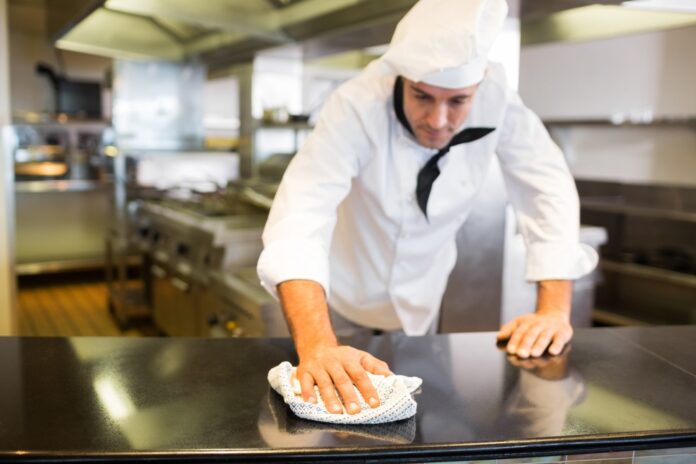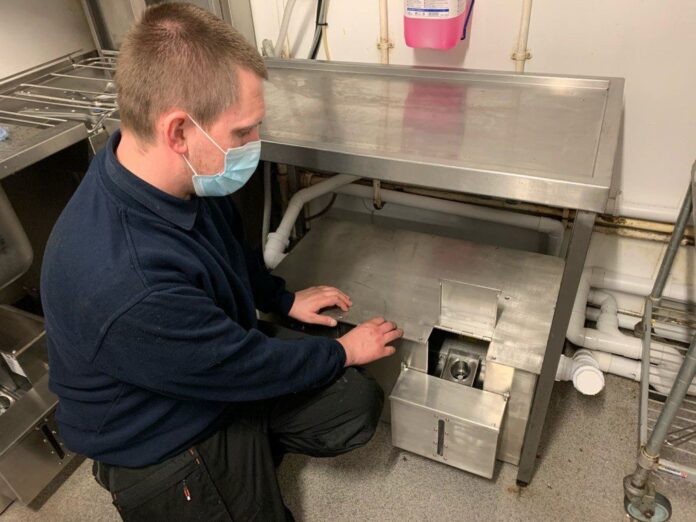In the culinary world, the kitchen is the heart and soul of any establishment. Its cleanliness is paramount, not just for aesthetic appeal but for health and safety reasons. This article offers a comprehensive guide to maintaining a spotless commercial kitchen, ensuring both efficiency and safety.
The Significance of Maintaining a Clean Kitchen

The significance of maintaining a clean kitchen extends far beyond mere aesthetics; it touches upon health, safety, efficiency, and even the reputation of the establishment.
Health and Safety Standards
At the forefront of the reasons to maintain a clean kitchen is the health and safety of both the staff working in the kitchen and the patrons consuming the dishes. The one that isn’t regularly cleaned can become a breeding ground for harmful bacteria and pathogens. Ingredients, especially raw meats and dairy, can harbor harmful microorganisms.
If these are allowed to proliferate due to poor hygiene, they can contaminate food, leading to illnesses. Foodborne diseases, such as salmonella and E. coli infections, can have severe consequences, ranging from mild discomfort to life-threatening conditions.
By ensuring that every surface, tool, and appliance in the kitchen is cleaned and sanitized regularly, the risk of such contaminations is drastically reduced.
Moreover, a clean one also minimizes the risk of accidents. Spills that aren’t cleaned promptly can become slip hazards. Grease build-up can lead to fires, and clutter can result in cuts or injuries. Regular cleaning and organization ensure that the kitchen remains a safe workspace for all.
Building Customer Trust
Beyond the immediate health implications, a clean kitchen plays a pivotal role in building and maintaining the trust of customers. In an age where information travels at lightning speed, the reputation of a restaurant can be made or broken by word of mouth and online reviews.
A single incident related to poor hygiene can tarnish the reputation of an establishment, sometimes irreparably. On the flip side, a spotless kitchen that adheres to the highest standards of cleanliness can become a significant selling point. Customers feel more at ease knowing that their food is prepared in a hygienic environment.
The trust, once established, can lead to repeat business, positive reviews, and loyal patronage. Furthermore, a clean and organized kitchen leads to better efficiency and productivity.
Daily Cleaning Rituals for Optimal Hygiene

The bustling environment of a commercial kitchen, with its constant flurry of activity, can quickly lead to messes and disarray. However, to ensure the highest standards of hygiene and efficiency, it’s imperative to incorporate daily cleaning rituals.
These routines not only maintain the kitchen’s cleanliness but also contribute to its smooth operation, ensuring that every dish that leaves the room is of the highest quality.
Surface Cleaning
Surfaces in a kitchen, from countertops to cutting boards, are in constant contact with a variety of ingredients. Over the course of a day, these surfaces can accumulate food residues, spills, and even potentially harmful microorganisms.
It’s essential to wipe down every surface at the end of the day, if not after each use. Using a disinfectant or a food-safe sanitizer can eliminate bacterial and microbial growth, ensuring that these surfaces are safe for food preparation. Stainless steel surfaces, in particular, should be polished regularly to prevent corrosion and maintain their shine.
Garbage Management
With the volume of waste a commercial kitchen produces, managing garbage is a daily necessity. Emptying trash bins regularly, especially those for organic waste, prevents odors and pest infestations. It’s also essential to clean and disinfect the bins themselves regularly to prevent bacterial growth.
Checking Storage Areas

While the primary focus might be on the main kitchen area, it’s equally important to check storage areas daily. Ensuring that stored food is appropriately sealed and checking for signs of spoilage can prevent contamination. Regularly rotating stock, using the “first in, first out” principle, ensures that ingredients remain fresh.
Tackling Stubborn Stains and Build-ups
A commercial kitchen, with its high-intensity operations, is no stranger to stubborn stains and build-ups. From the caramelized residues on stovetops to the thick layers of grease in exhaust hoods, these challenging spots demand special attention.
Tackling stubborn stains and build-ups is possible by your team doing it on its own, or outsourcing this task to a foreign team. If you are looking for outside help, visit Kitchen Commercial Cleaning. Addressing them not only ensures a hygienic environment but also prolongs the life of kitchen equipment and enhances its efficiency.
Deep Cleaning Appliances
Regular use of kitchen appliances like ovens, grills, and stovetops can lead to accumulations of burnt food particles, oil splatters, and other residues. These build-ups can affect the performance of the appliances and even alter the taste of the food cooked on them.
- Grills: Grill grates often have charred food remnants clinging to them. A robust grill brush, preferably with brass bristles, is effective in scrubbing away these stubborn bits. For deeper cleans, soaking the grates in a mixture of vinegar and water can help dissolve the build-up, making it easier to scrub off.
- Stovetops: Gas burners and electric stovetops can have spills and overflows from pots and pans. Removing the burners and soaking them in soapy water can help in breaking down the build-up. For the stovetop itself, using a gentle scouring pad with a mild detergent can effectively remove stains without scratching the surface.
Grease Management

Grease is a common byproduct, and its accumulation can lead to multiple issues, from reduced appliance efficiency to fire hazards.
- Exhaust Hoods and Fans: These are designed to pull away smoke and grease vapors from the cooking area. Over time, they can have a thick layer of grease build-up. Regularly checking and cleaning or replacing the filters can prevent this.
- Grease Traps: These devices, often connected to sinks, are designed to capture grease before it enters the wastewater system. Neglected grease traps can lead to blockages and unpleasant odors. Regularly scheduled cleanings, depending on the volume of grease produced, are essential.
Wrapping Up
A spotless commercial kitchen is an asset to any food establishment. By implementing the tips and hacks discussed, restaurants can ensure a safe, efficient, and trustworthy environment for both staff and customers. Cleanliness, after all, is at the heart of great culinary experiences.









